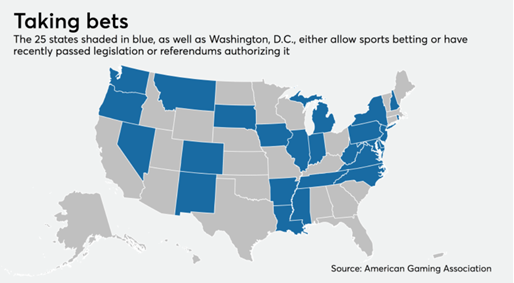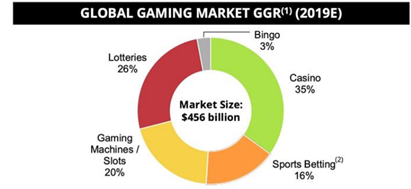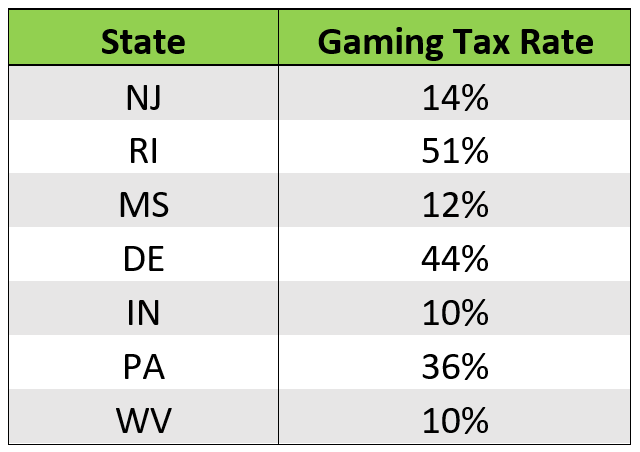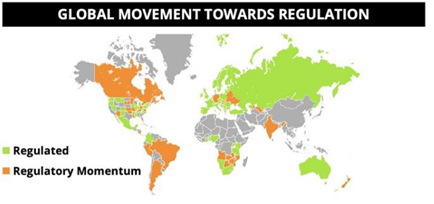“There aren’t many industries that have rebounded with such high velocity post-pandemic to record revenue numbers. Online casino and sports betting have seen a meteoric rise over the last eight months.”
– Vice President of U.S. Business at the Gambling.com Group, Max Bichsel
“We believe the impact of Covid-19 could spur more states to legalize online casino and sports betting.”
– Morgan Stanley gaming analyst, Thomas Allen
______________________________________________________________________________________________________
When investors consider potential investment areas, headwinds and tailwinds are important factors that help provide clues about the future of a sector. Take Big Tech as an example. While the biggest names in tech have seen unmatched growth over the last decade and have recently benefited from a series of pandemic-propelled tailwinds, the next decade looks more challenging as most now face antitrust headwinds, mixed with lofty valuations that provide investors with constrained upside – at least relative to other sectors. Take the US dollar as another example. The once-mighty reserve currency that helped replace the Gold Standard in the 1930s has experienced decades of unmatched dominance. However, the US dollar now faces significant headwinds, in large part due to unbridled federal stimulus over the last decade, combined with a threat from China’s renminbi as a new reserve currency, and the rise of digital currencies, including Bitcoin and CBDCs (Central Bank Digital Currencies).
The thing about wind is that it can change direction within seconds, so the smallest sign that an external force might impact a sector could catapult it forward or drag it down suddenly. As an example, following the US elections in November, stocks traded higher across the board on news that a “blue wave” was unlikely (although we’d caution that still remains to be determined based on the results of Georgia’s Senate run-off in January), and received two shots in the arm (pun intended) when Pfizer and Moderna reported that both Covid vaccine candidates were more than 90% effective.
Amid all the closely tracked news, two fringe (and previously nefarious) investment areas that flew under the radar were the cannabis and gambling industries, which both had banner days on November 3rd. In the case of the cannabis industry, the 2020 election helped prove how broadly accepted marijuana has become throughout the United States, with measures breezing to victory in progressive New Jersey, moderate Arizona, and conservative Montana. A Gallup Poll released on November 9th indicated that 68% of Americans favor legalizing marijuana – double the approval rating from 2003. In all, fifteen states have now broadly legalized it, while 36 states allow medical marijuana use.
In the case of the gambling industry, after the federal ban on sports betting (known as the Professional and Amateur Sports Protection Act of 1992, PASPA, and the Bradley Act) was overturned in 2018, there have been a wave of sports betting and online gambling legalizations across the country. Following November’s elections, sports betting is now legal in 25 US states (41% of the US population) and online sports betting (OSB) is legal in 14 states (24% of the population).

This wave of legalizations underscores the tailwinds propelling both industries forward, as they move from the shadows into the mainstream. Now, it is worth noting that the societal and moral overtones of both industries are still debated by many, and our dissection of the space is centered solely on its merits as an investment opportunity.
With that disclaimer out of the way, the question for investors becomes: Are the cannabis and gaming industries the next frontier for aggressive investors? Put another way: In an era that’s been so heavily focused on growth, do these industries offer an emerging opportunity to invest in a space that is still in the early innings of its expansion? This week, we will be looking squarely at the gaming industry, while examining the cannabis industry in a future newsletter.
By The Numbers
Analysts estimate that the total size of the global gaming market in 2019 was $456Bn and the total size of the sports betting market was ~$73Bn, or 16% the total global gaming market. Goldman Sachs researchers estimate that global sports betting market, whether online or at a casino, is expected to grow 7.1% per year, crossing $100 billion in 2022.

In addition to online sports betting, online and mobile gambling (i.e. online poker, blackjack, slots, table games, etc.) have trended toward an increasingly material share of the total global gaming market, representing an estimated 12.2% of the total market in 2019, up from 9.5% in 2015. The Covid-19 pandemic has further propelled this trend, as more consumers — and gamblers — are staying home, with entertainment limited to their screens. The American Gaming Association estimates that 57% of last year’s casino visitors made a wager online in 2020.

Further, analysts expect that state budget shortfalls in the United States related to the Covid-19 pandemic will speed up the legalization process in many states, paving the way towards an expanding total addressable market. Supporting this growth thesis, analysts anticipate that the addressable market of one the largest US-based OSB companies will skyrocket from $900Mn in Q1 2020 to $4.4Bn by 2022.
The reason the legalization of gambling is expected to lift revenues for states is because fees and taxes associated with mobile betting are substantial, with initial licensing fees as high as $20mn (i.e. Illinois) and tax rates range from 7%-51% of gross gaming revenue.

Despite this projected uplift in revenue, the $1.4 billion in expected gross gaming revenue from legal U.S. sports betting this year will amount to just 8% of the estimated $17 billion in annual revenues for offshore sites and unregulated operators, providing even more incentive for states to move quickly to legalize sports and online betting as they look to address budget shortfalls due to the Covid-19 pandemic.
With the United States rapidly moving towards broad legalization of sports and online gambling, many countries around the world are also seeing momentum pick up, potentially expanding the global total addressable market for online and sports betting.

In the United States, much has been written about how a Joe Biden presidency might impact industries such as energy, healthcare, and housing. Far less has been written about how his presidency might impact fringe industries such as sports and online gambling. What has been written indicates that the president-elect “believes states and federal authorities should cooperate to ensure that gambling is safe, fair, and corruption-free,” but acknowledged that he “doesn’t support adding unnecessary restrictions to the gaming industry” while campaigning in Nevada earlier this year.
Barring an executive order (which seems unlikely), any further federal legislation around the legalization of online or sports betting would need congressional approval, focusing attention back on the ever-important Senate run-off in Georgia. However, since PASPA was overturned in 2018, states have had the authority to set laws around the legalization of sports and online betting, and we expect that to remain unchanged regardless of the outcome of January’s run-off.
With budget deficits running rampant across our union, states will undoubtedly look for new sources of revenue to cover shortfalls. As such, we expect even more states to legalize online and sports betting over the coming years, taking advantage of high initial licensing fees and gaming tax rates, while capturing revenue that was previously lost to offshore sites and unregulated operators. With the wind at its back, this wave of legalization should expand the total addressable market for the gaming industry in the United States even further, providing companies in the space with a growth opportunity only seen during major legislative reforms and societal changes. Additionally, as the global movement towards the legalization of online and sports betting picks up momentum, legislative tailwinds in the United States and around the world should make the industry a lucrative investment play over the next decade.

Michael Johnston
Tech Contributor
DISCLOSURE: This material has been prepared or is distributed solely for informational purposes only and is not a solicitation or an offer to buy any security or instrument or to participate in any trading strategy. Any opinions, recommendations, and assumptions included in this presentation are based upon current market conditions, reflect our judgment as of the date of this presentation, and are subject to change. Past performance is no guarantee of future results. All investments involve risk including the loss of principal. All material presented is compiled from sources believed to be reliable, but accuracy cannot be guaranteed and Evergreen makes no representation as to its accuracy or completeness. Securities highlighted or discussed in this communication are mentioned for illustrative purposes only and are not a recommendation for these securities. Evergreen actively manages client portfolios and securities discussed in this communication may or may not be held in such portfolios at any given time.